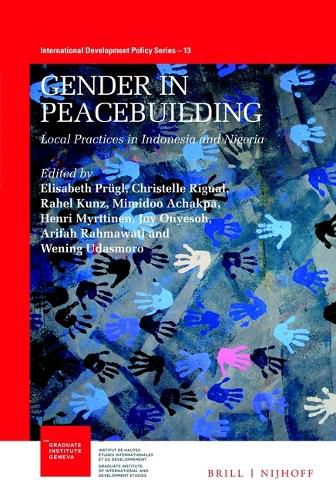Readings Newsletter
Become a Readings Member to make your shopping experience even easier.
Sign in or sign up for free!
You’re not far away from qualifying for FREE standard shipping within Australia
You’ve qualified for FREE standard shipping within Australia
The cart is loading…






Gender, age, class, ethnicity, religion, and political ideologies all matter in peacebuilding. Adopting a feminist approach, the 13th volume of International Development Policy analyses such intersecting differences in local contexts to develop a better understanding of how intersectionally gendered dynamics shape and are shaped by peacebuilding. In this volume, findings are presented from a six-year collaborative research project that, involving scholars from Indonesia, Nigeria, and Switzerland, investigated peacebuilding initiatives in Indonesia and Nigeria. The authors identify a number of logics that highlight how gender is deployed strategically or asserts itself inadvertently through gender stereotypes, gendered divisions of labour, or identity constructions.
Contributors include: Mimidoo Achakpa, Ceren Bulduk, Rahel Kunz, Henri Myrttinen, Joy Onyesoh, Elisabeth Prugl, Arifah Rahmawati, Christelle Rigual and Wening Udasmoro.
$9.00 standard shipping within Australia
FREE standard shipping within Australia for orders over $100.00
Express & International shipping calculated at checkout
Gender, age, class, ethnicity, religion, and political ideologies all matter in peacebuilding. Adopting a feminist approach, the 13th volume of International Development Policy analyses such intersecting differences in local contexts to develop a better understanding of how intersectionally gendered dynamics shape and are shaped by peacebuilding. In this volume, findings are presented from a six-year collaborative research project that, involving scholars from Indonesia, Nigeria, and Switzerland, investigated peacebuilding initiatives in Indonesia and Nigeria. The authors identify a number of logics that highlight how gender is deployed strategically or asserts itself inadvertently through gender stereotypes, gendered divisions of labour, or identity constructions.
Contributors include: Mimidoo Achakpa, Ceren Bulduk, Rahel Kunz, Henri Myrttinen, Joy Onyesoh, Elisabeth Prugl, Arifah Rahmawati, Christelle Rigual and Wening Udasmoro.